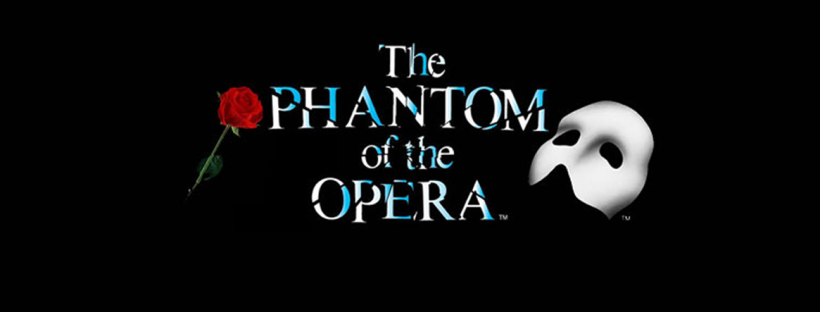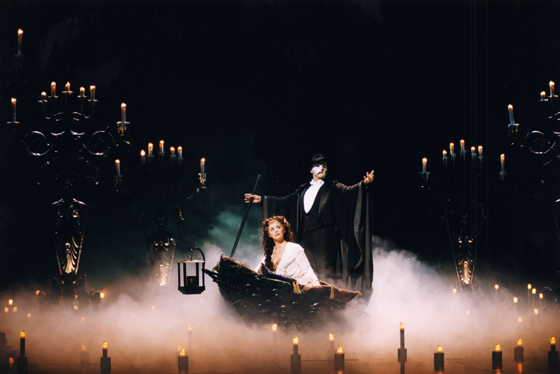MOROCCAN CHICKEN
18th December 2019QUOTES TO LIVE BY
28th January 2020The Phantom of The Opera
THE PHANTOM OF THE OPERA
The announcement that Andrew Lloyd Webber’s masterpiece The Phantom of the Opera, was coming to the Zorlu Performing Arts Centre in April 2015 was some of the best news I had heard all year. I had long wanted to see Lloyd Webber’s musical adaptation of the classic French novel Le Fantôme de L’Opéra by Gaston Leroux, having heard fantastic reviews, but sadly never had an opportunity to see it for myself. When this opportunity arose, I jumped at the chance and bought myself a ticket.
I had never actually been to a performance at the Zorlu Centre at this time, so this added a delightful extra treat to my evening out. I was lucky enough to be assigned a great seat with a good view, which was a pleasant surprise as sadly the Biletix website does not let you choose, and the map on the website is so small it requires a microscope to be able to understand! These days I am far better acquainted with the Arts Centre, and can pretty much tell whether a seat is good or not just by the seat numbers.

For anyone not familiar with the story, the musical opens with an auction, the sale of the Paris Opera House’s theatre props in 1911. The production handled this marvellously, with a full cast of auctioneers, assistants and commisioners on stage, which brought the scene to life and started the production off perfectly.
Raoul, a 70 year-old man in a wheelchair, buys a poster and a music box, which unlocks hidden memories and brings back fond recollections of someone who was once very special to him. As the auction proceeds a shattered chandelier is put up for sale, with the auctioneer highlighting its role in an old, unsolved mystery, and its macabre connection with a phantom that once haunted the old Opera House. As the chandelier is uncovered it begins to glow, then slowly ascends to its original setting high above the audience. The music swells as the orchestra begins to play the overture, and Act One begins…!
Act One begins properly with the rehearsal of the opera Hannibal. Prima Donna Carlotta, the leading soprano, is practicing her performance. As she sings, Monsieur Lefèvre, the retiring Director, is showing the new directors Messieurs Firmin and André around the Opera House, taking in the rehearsal.
As Carlotta begins her aria the backdrop behind her dramatically collapses, nearly killing her. It is now that we here the first whisperings of the ghostly Phantom who supposedly haunts the Opera House, and is usually blamed for accidents and upsets (of which there are many). Unsettled by the incident, Carlotta refuses to continue with the rehearsal, and declaims that she will not perform under such dangerous, ghostly conditions. The new directors are ready to cancel the evening’s performance until Madame Giry, the ballet mistress, comes forward with the news that one of the chorus girls, Christine, is ready to sing the lead role, and has an unexpectedly beautiful voice.
Enchanted by Christine’s until now overlooked talents, the new directors agree that she will stand in for Carlotta that evening. We discover that Christine has been taking singing lessons from a mysterious stranger, known to her only as ‘The Angel of Music’.
Following her debut Christine receives her old childhood friend Raoul in her dressing room. He is full of congratulations for her wonderful performance, and invites her for dinner. Christine however feels she must refuse him, as her mysterious teacher is a hard taskmaster and would not allow it.
Christine explains to Raoul that her teacher is none other than ‘The Angel of Music’ from the stories that her father once told both of them when they were children. Incredulous and jealous, Raoul (who is secretly in love with Christine) tells her that the stories are pure fantasy, and cannot possibly be true.
As Raoul leaves, the Phantom appears in Christine’s dressing room mirror. Terrified, she demands he reveal himself, which he does, as none other than her mysterious ‘Angel of Music’ and teacher. He explains his role to Christine, and convinces her to follow him deep into the dark places below the Opera House. As they board a gondola the Phantom sings to Christine, to calm her fears and help ease her concerns as they travel across an underground lake and go deeper into his subterranean world.
On arrival at the Phantom’s home, Christine is confronted by a vision of herself, in a wedding gown, and is once again overcome by terror. She faints, and is awakened some time later by the sound of a strange little monkey music box. She sees the Phantom composing music at his organ, distracted, and her curiosity overcomes her fear. She approaches the Phantom, and finding him completely immersed in his music, she takes off his mask to reveal his hideously deformed face.
The Phantom is aghast by her actions, and ashamed that she has seen him as he truly is. He confesses to Christine that he is deeply in love with her, and longs to look normal, as he knows she could not possibly return his love looking as he does. Although reluctant to lose her, the Phantom agrees to return her to the theatre after realising that her absence would result in an investigation and search of the Opera House.
Following Christine’s performance in Hannibal, Madame Giry delivers a note from the Phantom to the new directors demanding that Christine replace Carlotta in his new opera, Il Muto, threatening terrible repercussions if his demands are not met. Carlotta is outraged, and the directors assure her that she will remain lead soprano. But during her performance that evening the Phantom curses her voice, and she is unable to make a sound except to croak like a frog. Despite this calamity the Ballet Corps attempts to keep the show running, when suddenly the lifeless body of the stagehand Buquet appears hanging from the rafters, before crashing to the floor. The cast panics, and just as the directors are pleading for calm, the sinister laughter of the Phantom can be heard offstage.
Christine is terrified by these developments and finds Raoul, who takes her to the roof of the theatre, overlooking the whole of Paris, to be safe from the Phantom. Christine tells Raoul of her encounter with the Phantom and his world under the Opera House, and while he does not believe her Raoul swears to love and protect her from harm. Lurking in the shadows, the Phantom overhears the conversation and vows to seek revenge against Raoul. Act One comes to a dramatic climax as the vast chandelier crashes to the stage, and the curtain falls.
Act Two opens six months later, with a gala masquerade ball. The Phantom is in attendance, disguised as the Red Death. He reveals himself to the guests, announces that he has written a new opera, Don Juan Triumphant, and demands that it be produced immediately with Christine in the lead role. Again, he warns of horrible consequences unless his demands are met. The Phantom approaches Christine, now engaged to Raoul, grabs her engagement ring, and vanishes in a flash of fire and smoke.
Traumatised by the events of six months ago, the directors put the new opera into production with Christine playing the lead, according to the Phantom’s demands. Raoul however has a plan to trap and capture the Phantom, convinced that he will attend the premiere. Distraught and torn between her love for Raoul and her sympathy for the Phantom, Christine visits her father’s grave, wishing that he were still alive to guide her. The Phantom appears to Christine in the cemetery, and she once again begins to fall under his spell, until Raoul arrives to rescue her. The Phantom lays down a challenge to Raoul, but Christine pleads with him and persuades Raoul to leave with her.
On opening night of the new production the Opera House is surrounded by police, eager to catch the Phantom. As Christine launches into her duet on stage with Piangi, the lead tenor, she realises with horror that she is actually singing with the Phantom. Piangi lies dead backstage, strangled by the Phantom, who uses this opportunity to express his love for Christine. Unmoved, Christine rips off his mask, exposing the Phantom’s deformity to the audience, who are shocked. The Phantom grabs Christine and flees the theatre at once.
Madame Giry is able to tell Raoul how to find the Phantom’s underground lair, and he arrives to find Christine forced into the wedding dress the Phantom had prepared for her. Raoul is immediately taken prisoner by the Phantom, who tells Christine that he will only free Raoul if she agrees to stay underground with him forever. If not, Raoul will die. Christine comforts the Phantom, and overcome with having experienced compassion for the first time in his life he agrees to set them both free. Raoul and Christine leave, and the Phantom begins to weep, covering himself with his opera cape.
Moments later an angry mob, searching for Christine and hell-bent on destroying the Phantom, burst into his underground home, but they are too late. The Phantom has vanished, leaving only his mask behind.
Composer: Andrew Lloyd Webber
Lyricist: Charles Hart
Lyricist: Richard Stilgoe
Director: Harold Prince
Choreographer: Gillian Lynne
Theatrical Producer: Cameron Mackintosh
Producer: The Really Useful Group LTD.



